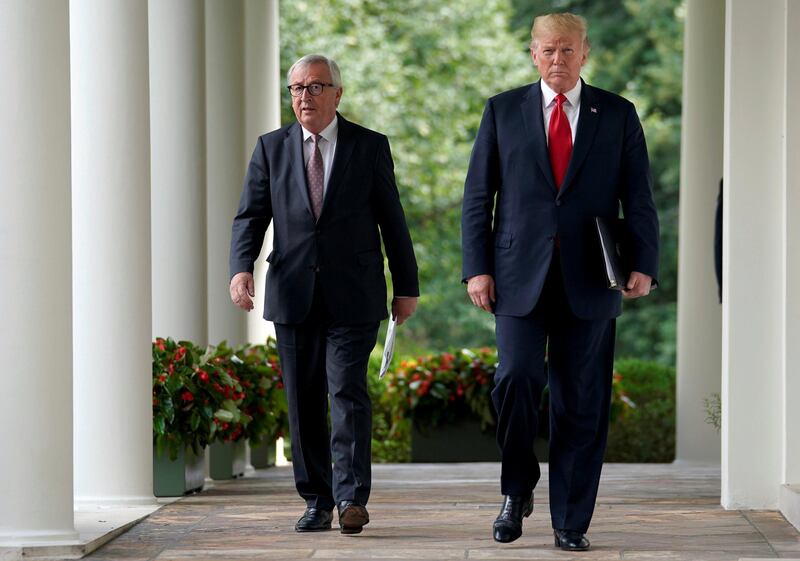It is tempting to say that there is a Trump-shaped hole in the current map of global geopolitics – the leadership void he leaves thanks to the US president's inexperience, temperament, indolence and, in a few rare cases, strongly held beliefs.
But that would be misleading. It would make the mistake of taking Donald Trump out of context. Because the hole in the map is not Trump-shaped, it is America-shaped.
Someday, when history looks back on this era to describe America's retreat and its withdrawal from its historical leadership position, the actions and policies that brought it about will have to be described as those of George Bush, Barack Obama and Donald Trump. Mr Bush's overreach and the horrors of his failed war in Iraq, Mr Obama's hyper-cautiousness and indecision and Mr Trump's compounding of Mr Obama's errors, thanks to his nationalism and isolationism, together made that hole as big and as consequential as it is today.
Leaders around the world are now left to wonder what comes next. What if Mr Trump continues his policies for another two or even six years? What if he is forced from office due to the growing maelstrom of scandals that swirl around him? What if he is replaced by his Vice President Mike Pence? What if a Democrat takes the reins of the world’s most powerful nation? Will it be a voice from the left that could compound the Bush-Obama-Trump policies of the past 17 years with further reactions against the perceived threats of globalisation? Or will it be a move towards a more traditional foreign policy? Will Republicans re-embrace the aggressive policies of the neo-conservatives and take up conflicts against Iran and North Korea and perhaps, someday, even China?
Such questions are natural. And it is equally natural to assume that the answers lie in combing over a list of candidates and trying to gauge the political winds that blow in the US. But there are deeper changes afoot in the country that will have lasting consequences – those that might already be evident in the behaviour and policies of the past two decades.
A smart commentator, Norman Ornstein, of the American Enterprise Institute, recently tweeted a datapoint he says he regularly cites: “By 2040 or so, 70 per cent of Americans will live in 15 states. Meaning 30 per cent will choose 70 senators. And the 30 per cent will be older, whiter, more rural, more male, than the 70 per cent.”
_______________
Read more from David Rothkopf:
[ Cyber warfare: The dawn of a new era for which we are thoroughly ill-prepared ]
[ Great civilisations are built on the legacy of thought leaders, not warriors ]
[ We are witnessing the death throes of the US as the dominant power of the free world ]
_______________
The data comes from a study by the Weldon Cooper Centre for Public Service at the University of Virginia. Their study notes that within about 20 years, roughly half the US population will live in just eight states as a result of urbanisation. Those states are concentrated on the American coasts. They are where the country’s most diverse and most liberal populations will be found.
It is a fact of American politics, as in many countries, that when people live in diverse communities they are more tolerant and more open to different ideas and cultures. Rural or less populated, more homogeneous populations tend to be more cautious about outsiders, more resistant to change and consequently more nationalistic and more isolationist.
Mr Ornstein uses the data point to suggest that America is approaching a crisis, as power is increasingly concentrated in the hands of the country’s more conservative “red state” interior. This concentration allowed Mr Trump to win the 2016 election, even though he had three million fewer votes than Hillary Clinton because the founders of the US – in order to protect the rights of less populated agricultural states – gave them advantages in representation in the Senate and the electoral college.
But the disproportionate power these states have will only grow in the years ahead, thanks to the trends cited by Mr Ornstein and the University of Virginia study.
Why should people living on the other side of the world care if conservative Iowa, Kansas or Nebraska has more power in the US relative to more internationalist parts of the country? Because this trend will determine how the world's most powerful country for the forseeable future will act in the world. And right now, it seems fair to predict that the recent retreat of the US – whether temporarily reversed in the next few years or not – is likely to continue and perhaps deepen over the next several decades, unless something happens to force a mindset shift.
That is why the machinations of those who are filling the US void – especially China but also the EU and regional actors taking advantage of regional openings – are so important to watch.
They might not represent momentary adjustments but rather long-lasting and significant realignments. While the US will long have the power to make a decisive difference when and where it decides to act, it looks very likely that for the remainder of the lives of most of those in power around the world today, that America-shaped hole will remain.
And the competition to fill it is likely to determine many of the most important events of the era to come.
David Rothkopf is CEO of The Rothkopf Group, a visiting scholar at the Carnegie Endowment for International Peace and author of The Great Questions of Tomorrow





